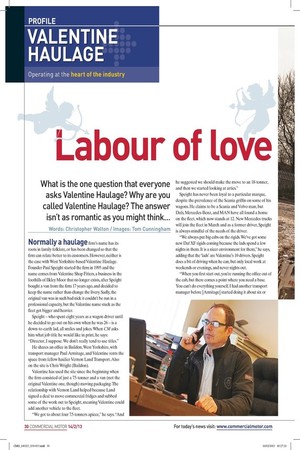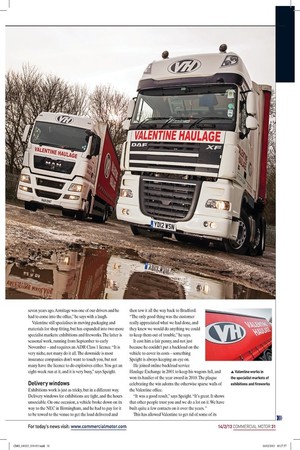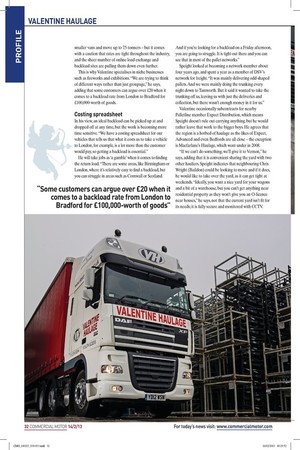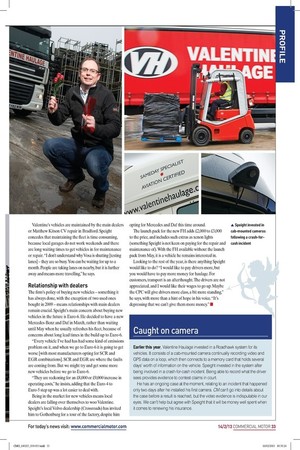Labour of love
Page 16

Page 17

Page 18

Page 19

If you've noticed an error in this article please click here to report it so we can fix it.
What is the one question that everyone asks Valentine Haulage? Why are you called Valentine Haulage? The answer isn't as romantic as you might think...
Agoras: unristopner Walton / Images: iom uunnmgham Normally a haulage firm's name has its roots in family folklore, or has been changed so that the firm can relate better to its customers. However, neither is the case with West Yorkshire-based Valentine Haulage. Founder Paul Speight started the firm in 1995 and the name comes from Valentine Shop Fitters, a business in the foothills of Ilkley Moor that no longer exists, after Speight bought a van from the firm 17 years ago, and decided to keep the name rather than change the livery. Sadly, the original van was in such bad nick it couldn't be run in a professional capacity, but the Valentine name stuck as the fleet got bigger and heavier.
Speight — who spent eight years as a wagon driver until he decided to go out on his own when he was 26— is a down-to-earth lad, all smiles and jokes. When CM asks him what job title he would like in print, he says: "Director, I suppose. We don't really tend to use titles."
He shares an office in Baildon, West Yorkshire, with transport manager Paul Armitage, and Valentine rents the space from fellow haulier Vernon Land Transport. Also on the site is Chris Wright (Baildon).
Valentine has used the site since the beginning when the firm consisted of just a 7.5-tonner and a van (not the original Valentine one, though) moving packaging. The relationship with Vernon Land helped because Land signed a deal to move commercial fridges and subbed some of the work out to Speight, meaning Valentine could add another vehicle to the fleet.
"We got to about four 7.5-tonners apiece," he says. "And he suggested we should make the move to an 18-tonner, and then we started looking at artics."
Speight has never been loyal to a particular marque, despite the prevalence of the Scania griffin on some of his wagons. He claims to be a Scania and Volvo man, but Dafs, Mercedes-Benz, and MAN have all found a home on the fleet, which now stands at 12. New Mercedes trucks will join the fleet in March and as a former driver, Speight is always mindful of the needs of the driver.
"We always put big cabs on the rigids.We've got some new Daf XF rigids coming because the lads spend a few nights in them. It is a nicer environment for them," he says, adding that the 'lads' are Valentine's 10 drivers. Speight does a bit of driving when he can, but only local work at weekends or evenings, and never nights out.
"When you first start out, you're running the office out of the cab, but there comes a point where you need a base. You can't do everything yourself I had another transport manager before [Armitage] started doing it about six or seven years ago. Armitage was one of our drivers and he had to come into the office," he says with a laugh.
Valentine still specialises in moving packaging and materials for shop fitting, but has expanded into two more specialist markets: exhibitions and fireworks. The latter is seasonal work, running from September to early November — and requires an ADR Class 1 licence. "It is very niche, not many do it all. The downside is most insurance companies don't want to touch you, but not many have the licence to do explosives either. You get an eight-week run at it, and it is very busy," says Speight.
Delivery windows Exhibitions work is just as tricky, but in a different way. Delivery windows for exhibitions are tight, and the hours unsociable. On one occasion, a vehicle broke down on its way to the NEC in Birmingham, and he had to pay for it to be towed to the venue to get the load delivered and then tow it all the way back to Bradford. "The only good thing was the customer really appreciated what we had done, and they knew we would do anything we could to keep them out of trouble," he says.
It cost him a fair penny, and not just because he couldn't put a backload on the vehicle to cover its costs — something Speight is always keeping an eye on.
He joined online backload service Haulage Exchange in 2001 to keep his wagons full, and won its haulier of the year award in 2010. The plaque celebrating the win adorns the otherwise sparse walls of the Valentine office.
"It was a good result," says Speight. "It's great. It shows that other people trust you and we do a lot on it. We have built quite a few contacts on it over the years.
This has allowed Valentine to get rid of some of its smaller vans and move up to 7.5-tonners — but it comes with a caution that rates are tight throughout the industry, and the sheer number of online load exchange and backload sites are pulling them down even further.
This is why Valentine specialises in niche businesses such as fireworks and exhibitions. "We are trying to think of different ways rather than just groupage," he says, adding that some customers can argue over £20 when it comes to a backload rate from London to Bradford for £100,000-worth of goods.
Costing spreadsheet In his view, an ideal backload can be picked up at and dropped off at any time, but the work is becoming more time sensitive. "We have a costing spreadsheet for our vehicles that tells us that what it costs us to take a vehicle to London, for example, is a lot more than the customer would pay, so getting a backload is essential."
He will take jobs as 'a gamble' when it comes to finding the return load. "There are some areas, like Birmingham or London, where it's relatively easy to find a backload, but you can struggle in areas such as Cornwall or Scotland.
And if you're looking for a backload on a Friday afternoon, you are going to struggle. It is tight out there and you can see that in most of the pallet networks."
Speight looked at becoming a network member about four years ago, and spent a year as a member of DSV's network for freight. "It was mainly delivering odd-shaped pallets. And we were mainly doing the trunking every night down to Tamworth. But it said it wanted to take the trunking off us, leaving us with just the deliveries and collection, but there wasn't enough money in it for us."
Valentine occasionally subcontracts for nearby Palletline member Expect Distribution, which means Speight doesn't rule out carrying anything, but he would rather leave that work to the bigger boys. He agrees that the region is a hotbed of haulage as the likes of Expect, Advanced and even Bedfords are all close — the exception is Macfarlane's Haulage, which went under in 2008.
"If we can't do something, we'll give it to Vernon," he says, adding that it is convenient sharing the yard with two other hauliers. Speight indicates that neighbouring Chris Wright (Baildon) could be looking to move and if it does, he would like to take over the yard, as it can get tight at weekends. "Ideally, you want a nice yard for your wagons and a bit of a warehouse, but you can't get anything near residential property as they won't give you an 0-licence near houses," he says, not that the current yard isn't fit for its needs; it is fully secure and monitored with CCTV.
Valentine's vehicles are maintained by the main dealers or Matthew Kitson CV repair in Bradford. Speight concedes that maintaining the fleet is time consuming, because local garages do not work weekends and there are long waiting times to get vehicles in for maintenance or repair. "I don't understand why Vosa is shutting [testing lanes] — they are so busy. You can be waiting for up to a month. People are taking lanes on nearby, but it is further away and means more travelling," he says.
Relationship with dealers The firm's policy of buying new vehicles — something it has always done, with the exception of two used ones bought in 2009— means relationships with main dealers remain crucial. Speight's main concern about buying new vehicles in the future is Euro-6. He decided to have a new Mercedes-Benz and Daf in March, rather than waiting until May when he usually refreshes his fleet, because of concerns about long lead times in the build up to Euro-6.
"Every vehicle I've had has had some kind of emissions problem on it, and when we go to Euro-6 it is going to get worse [with most manufacturers opting for SCR and EGR combinations]. SCR and EGR are where the faults are coming from. But we might try and get some more new vehicles before we go to Euro-6.
"They are reckoning for an £8,000 or £9,000 increase in operating costs," he insists, adding that the Euro-4 to Euro-5 step up was a lot easier to deal with.
Being in the market for new vehicles means local dealers are falling over themselves to woo Valentine. Speight's local Volvo dealership (Crossroads) has invited him to Gothenburg for a tour of the factory, despite him opting for Mercedes and Daf this time around.
The launch pack for the new FH adds £2,000 to £3,000 to the price, and includes such extras as xenon lights (something Speight is not keen on paying for the repair and maintenance of). With the FH available without the launch pack from May, it is a vehicle he remains interested in.
Looking to the rest of the year, is there anything Speight would like to do? "I would like to pay drivers more, but you would have to pay more money for haulage. For customers, transport is an afterthought. The drivers are not appreciated, and I would like their wages to go up. Maybe the CPC will give drivers more class, a bit more standing," he says, with more than a hint of hope in his voice. "It's depressing that we can't give them more money." • Caught on camera Earlier this year, Valentine Haulage invested in a Roadhawk system for its vehicles. It consists of a cab-mounted camera continually recording video and GPS data on a loop, which then connects to a memory card that holds several days' worth of information on the vehicle. Speight invested in the system after being involved in a crash-for-cash incident. Being able to record what the driver sees provides evidence to contest claims in court.
He has an ongoing case at the moment, relating to an incident that happened only two days after he installed his first camera. CM can't go into details about the case before a result is reached, but the video evidence is indisputable in our eyes. We can't help but agree with Speight that it will be money well spent when it comes to renewing his insurance.






























